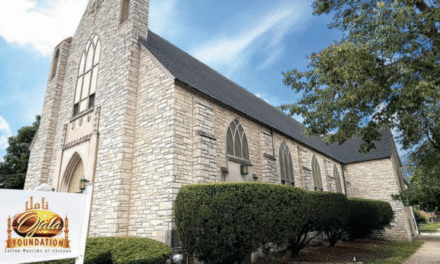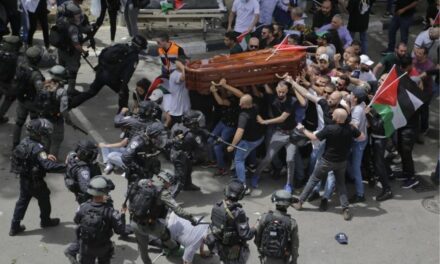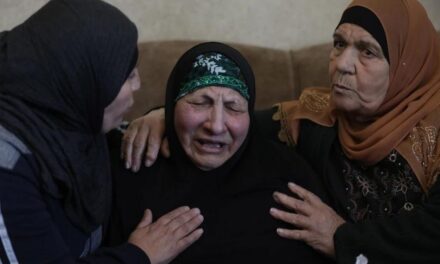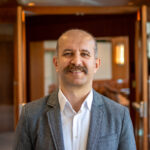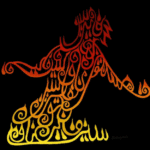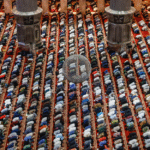Col. Khallid M. Shabazz buttons his Army Service Uniform jacket after having the rank of Colonel placed on his uniform at his promotion ceremony on Oct. 4, 2018 at Hickam Officer’s Club, Joint Base Pearl Harbor-Hickam, Hawaii. Shabazz earned a Doctorate of Ministry from North Texas Theological Seminary at Tyler, Texas. (Sgt. Malcolm Cohens/Army)
He thinks he should have died on the helicopter flight to the hospital. Six men had just “jumped him,” shooting him and beating him with a shovel.
Against all odds, Army Col. KhaLlid Shabazz survived — just like he had survived childhood sexual abuse.
It wasn’t an easy road that Shabazz took to join the Army, which he did in 1992. Now he serves as the command chaplain for U.S. Army Central, the three-star command responsible for land operations in the Middle East.
He’s the first Muslim chaplain in the U.S. military to reach the rank of colonel, according to Col. Armando Hernandez, an ARCENT spokesperson. Army Times spoke with Shabazz about his unique career as one of the military’s handful of Muslim chaplains throughout the wars in Iraq and Afghanistan.
Shabazz, a 6-foot-4-inch former college football player who is built like a brick house, has become a TikTok microcelebrity in recent months. He mostly shares gym videos and motivational content with his nearly 23,000 followers, in addition to sparring occasionally with negative commenters.
He describes himself as “just a person that is trying to inspire people.”
Shabazz joined the Army as a field artilleryman after getting kicked out of college for retaliating against one of the men who shot him, he said. But that, and his conversion to Islam, didn’t immediately solve his problems, he found.
In fact, converting and changing his name led some of his colleagues to shun him, he explained.
“Within the first year, I had two Article 15s, [involuntary separation] paperwork in hand,” he said. “I had already decided I was going to take my [own] life because I was a horrible father, a drunk and an even worse husband.”
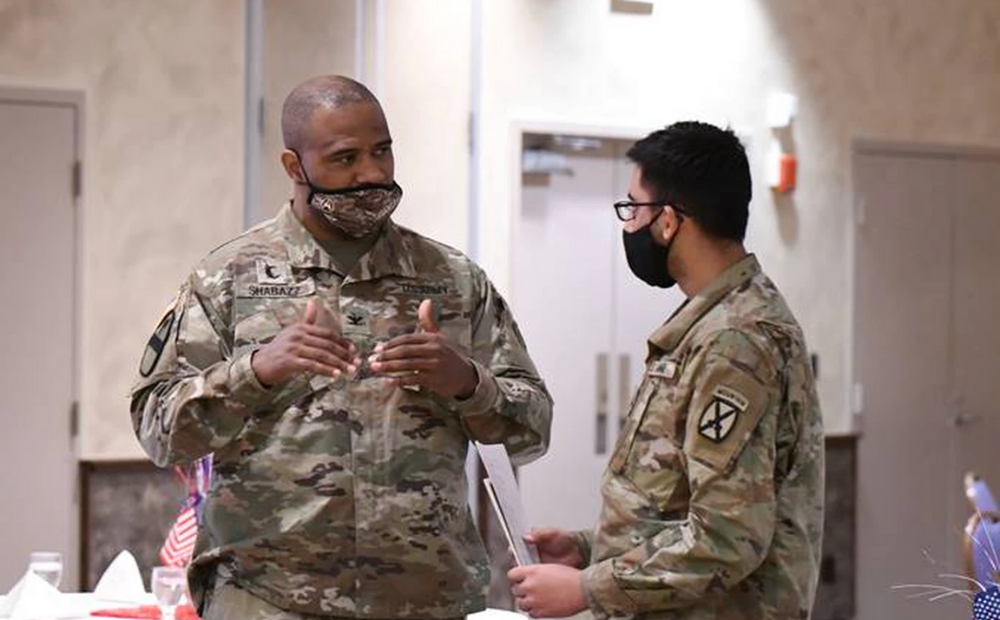
Chaplain (Col.) Khallid Shabazz, U.S. Army Central Command chaplain, talks with a 10th Mountain Division soldier before the National Day of Prayer luncheon May 6 at the Commons. Shabazz was the guest speaker at the event, and spoke about the importance of taking care of one another. (Mike Strasser/Army)
Instead of kicking him out, though, his battalion sergeant major decided to take him under his wing. Soon after that, a Christian chaplain approached him during a field exercise with a suggestion: why don’t you become a Muslim chaplain?
“I was sitting on my [vehicle], and I was crying because I couldn’t believe I was being treated so badly for my personal choice,” he said. “As God would have it, the chaplain came over to me…and he talked to me for about an hour.”
The conversation changed “the whole way I looked at life,” Shabazz said. So he stayed in touch with the chaplain, and soon enrolled in an Islamic seminary. He became an Army chaplain in 1998.
At the time, there were virtually no Muslim chaplains in the Army. And as recently as 2017, according to McClatchy, he was one of only five.
In the decades since, he’s done his best to be an advocate for soldiers of all faiths, he explained. It’s what Army chaplains are charged to do. That was especially challenging after the 9/11 attacks, he said, to be “dealing in the realm where you’re kind of a novelty.”
“Initial interactions with commanders and soldiers were tough,” Shabazz said. But fellowship on the basketball court and in the gym would always help him integrate with the soldiers and leaders at each new duty station.
For young Muslim soldiers, like Shabazz once was, the connection is immediate, and it always extends to Muslim troops in neighboring units who hear about a chaplain who shares their faith.
Ministering to them “brings me to tears, because those young men and women out there need representation, just like everybody else,” he said.
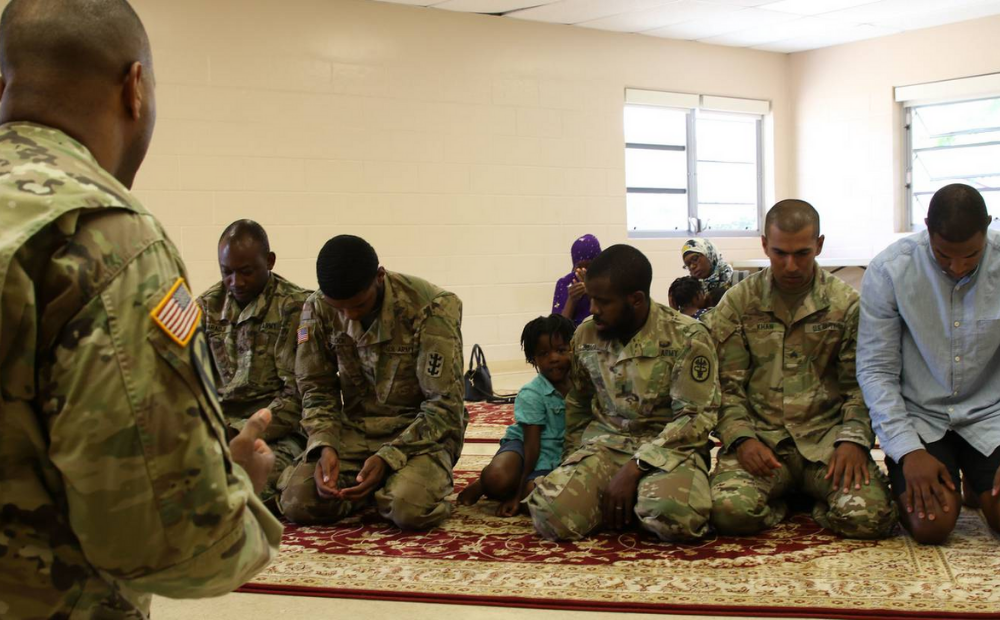
Then-Lt. Col. Khalid M. Shabazz speaks to service members in the midst of an Islamic service on Sept. 21, 2018, at Schofield Barracks, Hawai’i. (Sgt. 1st Class Claudio R. Tejada/Army)
One of his most rewarding duties, Shabazz said, was helping to integrate former Iraqi and Afghan interpreters into the Army beginning in the late 2000s. He acted as a cultural liaison between the interpreters and their training commanders at Fort Jackson, South Carolina.
“It did wonders for them, because they felt like they had somebody who understood them,” he said. “When I [had] those conversations…[they] always said, ‘Wow, the Army cares about us [Muslims] enough to have an imam in uniform.’”
His unique status as the Army’s senior-most Muslim chaplain — and as ARCENT command chaplain — has allowed him opportunities to assume a role of strategic and even diplomatic importance in the Middle East.
In 2019, he traveled to Kuwait and Qatar during the Muslim holy month of Ramadan.
During that trip, Shabazz spoke at the Grand Mosque of Kuwait in Kuwait City, and met with diplomats, military leaders and senior government officials, he said.
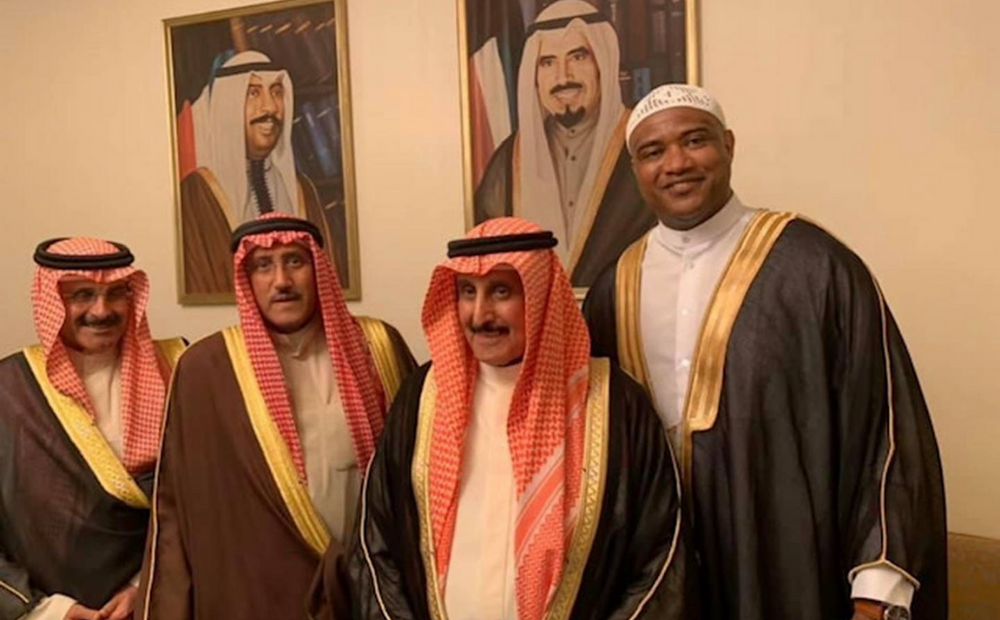
U.S. Army Central’s Command Chaplain, Col. Khallid Shabazz, with the Kuwait Royal Family during Ramadan before breaking the fast in 2019. (Courtesy of Khallid Shabazz)
“For me, at that moment [in the Middle East], I got to be honest with you — man, it was all worth it,” he confided. “All the pain, all of the fire that I had to go through in the early ranks…It seemed all worth it at that point.”
Now he’s trying to improve his outreach efforts through TikTok, he explained.
“That space opens up opportunities for people to talk to [me],” Shabazz said. “I mean, who would talk to me in the [post exchange]? I’m tall, I’m a colonel, and I’m Muslim!”
The platform serves to make him more approachable, he explained.
“On TikTok, if I’m in there with these motivational videos and clowning around…people feel safe enough to talk to me,” he said. “I want to spend the rest of my life…inspiring young people.”
“That will be fitting enough for me,” he added.

